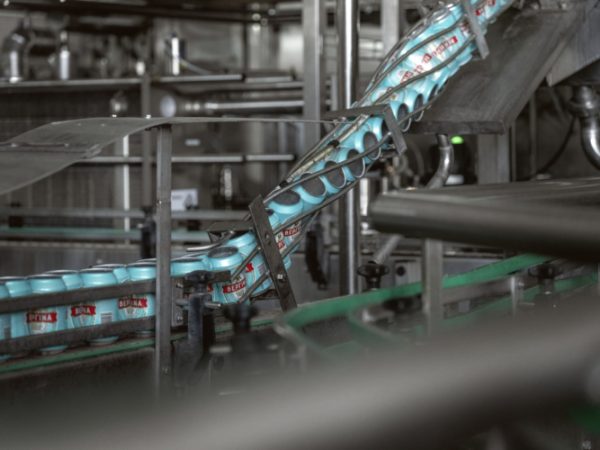Although in Greece’s “hot market” (supermarkets, food stores, etc.) beer sales have… cooled down, in the “on trade” channel, i.e. bars, cafes and restaurants, beer is selling like the proverbial hotcakes, with the revenues of Greek breweries, large and small, increasing to the cheers of tourists.
In 2022, despite inflationary pressures and high costs in energy, raw materials, packaging and transport, the domestic beer market looks set to close at pre-Covid-19 levels, approaching 4 million hectoliters. In fact, if the forecasts for the extension of the tourist season are confirmed, the total return to pre-pandemic levels is considered a given.
As early as 2021, the losses of the pandemic (as the beer market for 2020 was down by about 25%) had been half recovered, while until August the growth rate was in double digits.
However, the rally in natural gas prices and raw materials such as malt is a big challenge for the entire industry.
As far as malt is concerned, the increase ranges from 60-65%, while the cost of bottles has risen 40-45%.
Despite the large price hikes in raw materials and transportation, breweries claim that the increases they have made range in an average low percentage (6-9%) as they are absorbing most of the increase themselves.
The image of the sector in Greece is reflected in the course of the economic data of the main “players”, who control a total of 78-80% of the market.
Revenues of Athenian Brewery over 2019 levels with the contribution of Bacardi
With domestic beer volume sales up 11% over 2020, Athenian Brewery‘s net sales grew by double digits in 2021, even surpassing 2019’s performance.
Specifically, net sales, i.e. excluding excise duty, amounted in 2021 to 225.63 million euros from 179.136 million euros in 2020 and 216.78 million euros in 2019.
As stated in the company’s financial statements, net sales increased by 24.86% due mainly to the increase in the sales volume and distribution of Bacardi products.
Bacardi is largely responsible for the company’s impressive increase in pre-tax profits, which reached 34.14 million euros, an increase of 285.49%. In fact, it was 84.8% higher than in 2019.
In terms of profits after tax, these amounted to 26.69 million euros compared to profits of 6.05 million euros in 2020 and 24.63 million euros in 2019.
For this year, Athenian Brewery management reports that the result of the first half of 2022 will be “sufficiently profitable for the company”, while the company’s strategy remains stable in terms of controlling operating costs and continuously monitoring credit risk.

Return to profit for Olympic Brewery
Retaining the support of parent Carlsberg, Olympic Brewery closed 2021 with significant sales growth and a return to profits.
In particular, according to the data of the 2021 financial report, net sales amounted to 96.06 million euros from 71.49 million euros in 2020 and 104.66 million euros in 2019.
Profits before taxes and financial results amounted to 10.96 million euros against losses of 4.58 million euros in 2020. In 2019, profits before taxes and financial results had reached 15.79 million euros.
Net profit after tax stood at €5.52 million against a loss of €9.43 million in 2020 and a profit of €1.68 million in 2019.
The company’s total sales volume increased by 24%, including overseas sales, while domestic sales volume increased by 19% mainly due to increased sales in the “cold market”. Sales volume directed to exports increased by 36%.
On an investment level, last year Olympic Brewery allocated funds amounting to 6.3 million euros in the direction of the modernization of its production units in technological equipment and automation of its systems.
The effect of high energy and raw material prices is expected to affect the company but to a lesser extent mainly due to the purchase of raw materials through agreements of the parent group Carlsberg.

EZA group turnover at +35%
The reduced negative effects of the pandemic on the beer market during the year 2021 contributed to the increase in the turnover of the Hellenic Brewery Atalanti (EZA) group, which amounted to 33.26 million euros against the amount of 24.53 million euros during fiscal year 2020 and 34.52 million euros in 2019.
In terms of profitability, the group returned to profits with the results after taxes in 2021 amounting to 71 thousand euros against a loss of 2.181 million euros during fiscal year 2020. The group had presented a loss of 2.082 million euros during fiscal year 2019 as well.
Regarding the effect of the Ukraine-Russia war on the disruption of the supply chain and the increase in the prices of raw materials, EZA is well protected as it has entered into annual contracts with their main suppliers in time, before the start of the war, to ensure stable prices for most of the raw materials that are expected to be consumed against the current year, with the result that a limited effect is expected from this development on the results of the year 2022.
The shift of the consumer public towards Greek products in recent years is expected to have a positive effect on the company’s divs, the management reports, pointing out that an expansion of the market share is expected for this reason.

Vergina turnover at +7.25%, albeit with losses
The administration of Macedonia Thrace Brewery (Vergina) reports that 2021 was a year of recovery, which came from the opening of the catering and tourism sectors.
In 2021 the turnover was 22.72 million euros showing an increase of 7.25% from 2020, which is due to the increased sales volume of beer in the current year, but also to the increased sales of malt and barley. In 2019, the company’s turnover was 22.82 million euros.
Gross profit for the year amounted to 7.05 million euros, showing a slight decrease of 1.65%, which is mainly due to the increased production costs of finished products, while in 2019 it had risen to 7.60 million euros.
The year closed again with losses, but reduced from those of 2020 (193.6 thousand euros from 338.3 thousand euros in 2020 and profits of 1.17 million euros in 2019).
Regarding the energy and inflation crisis, management estimates that there will be indirect effects from potentially affected industries and expects a significant impact from increases in raw materials, energy, inflation, fuel and supply chain disruptions.




